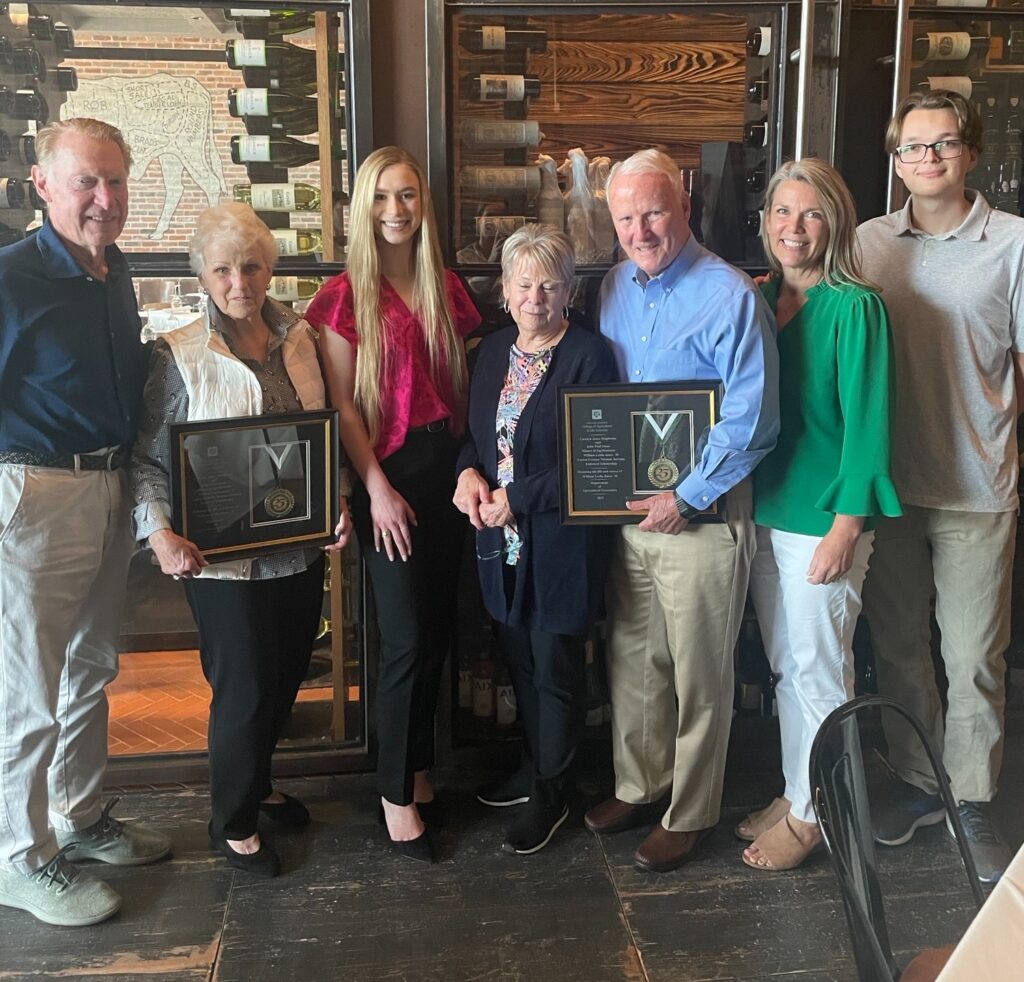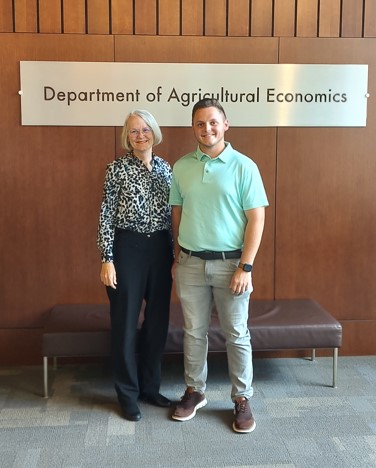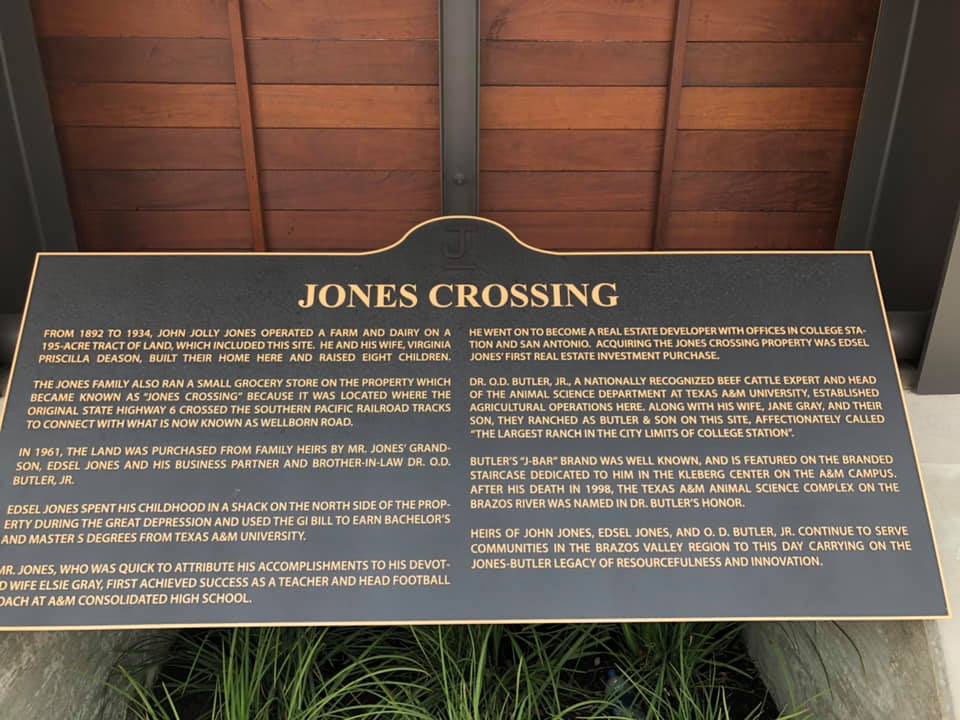Father’s legacy honored through endowed scholarship
Jones/Waghorne family scholarship helps graduate students in agribusiness program
When it comes to families with deep roots in Texas agribusiness and a desire to help future generations of agribusiness leaders, it’s hard to keep up with the Joneses.
During his lifetime, William Leslie “W.L.” Jones ’30 became known as a driving force in South Texas agribusiness, but to his three children — Cynthia, Carolyn and John Paul, “JP” – he was known simply as “Pop.”
Recently, his family decided to do something special to honor his ties to both agribusiness and Texas A&M.
“My brother, sister and husband discussed it together and wanted to establish a scholarship in honor of my father,” said Carolyn Jones Waghorne. “He was a devoted Aggie and graduated in 1930 with a master’s degree in agriculture. We wanted to do something that would recognize and honor him, as well as continue his agribusiness legacy.”
Setting up the scholarship
In 2022, the Jones family, including Richard Waghorne ’62, Carolyn’s husband, met with representatives of the Texas A&M Foundation for the College of Agriculture and Life Sciences to discuss endowing a scholarship. The result was the William Leslie Jones ’30 Borlaug Scholarship.

“We wanted to make this a scholarship available to graduate students as some of them might be married and may have even started a family,” said Carolyn Waghorne. “There seemed to be a lot of scholarships available to undergrads, so we wanted ours to benefit graduate students.”
“We’ve been fortunate in life and wanted to share some of what life has given us with others,” said JP Jones. “We looked at this scholarship as a way we could help support young people in their education and to continue to make an impact long after we’re gone.”
By combining this new scholarship with a $1 million gift from Cactus Feeders that established the Norman Borlaug Endowed Research Scholars Program at Texas A&M University, the $125,000 William Leslie Jones scholarship received matching funds to create a $250,000 endowment, said Collin Arledge, the foundation’s director of development for the College.
The gift agreement states, “Distributions from this endowment will be used to provide one scholarship to a full-time student in good standing pursuing a graduate degree in the Master of Agribusiness Program in the College of Agriculture and Life Sciences at Texas A&M University in College Station, Texas.”
“This scholarship highlights the beauty of the impact made through the collaborative efforts of many toward one common goal,” Arledge said. “The Jones/Waghorne family, in their desire to continue the legacy left by their father, William Leslie Jones, was able to utilize the matching gifts by Cactus Feeders to create a substantial scholarship that students will benefit from for decades to come.”
Investing in one’s education, in both time and money, is a tough balancing act, said Victoria Salin, Ph.D., director of the Master of Agribusiness Program in the Department of Agricultural Economics.
“The students in the Master of Agribusiness program often have economic challenges,” she said. “Unlike doctoral students, these students are usually not candidates for research assistantships. The scholarships from contributing families make a difference, helping students travel for an internship, attend an industry conference or engage in other worthwhile endeavors.”
Scholarship recipient Ryan Hames

So far, the William Leslie Jones scholarship has been awarded to two students — the most recent being Ryan Hames ’24, of Spring, a graduate student in the Master of Agribusiness Program. Hames was awarded a total of $8,000 from the endowed scholarship — $4,000 for two semesters.
“This scholarship has been very important to me, especially since there was a recent tragedy in my family,” Hames said. “This summer, my father passed away, leaving my family in a more difficult financial situation. The scholarship helped take a lot of the financial burden for my education off my mom, who also has my younger brother to care for.”
Hames said once he gets his master’s degree, he hopes to find a position in food production.
“I’m interested in how to develop new food products and the techniques used in their development,” he said. “I’m also interested in the marketing of different food products and the production management aspect of agribusiness.”
About W.L. Jones
W.L. Jones was the youngest of seven boys and one daughter born to Virginia Priscilla Deason and John Jolly Jones, who, in the late 19th century, established a dairy farm on a 195-acre tract of land in Brazos County near College Station.
The Jones family also ran a small grocery store on the same tract of land, which became known as Jones Crossing due to its location where the original Texas Highway 6 connected with the Southern Pacific Railroad crossing, intersecting with what is now Wellborn Road.
“My father was born in 1909, and in those days, high school ended on your 11th year of school,” explained J.P. Jones, principal at Trinity Staffing Services in San Antonio. “So, my father finished high school just after turning 16 and entered Texas A&M as a freshman that fall.”
W.L. Jones finished both his undergraduate and graduate degrees in 1930, just before he turned 21 years old. He also completed his Texas A&M University Corps of Cadets ROTC program and was waiting to receive his commission, which required his being at least 21 years of age.
When Jones graduated, the university’s graduate program awarded master’s degrees before bachelor’s degrees, so he walked across the stage to receive his master’s degree before he received his bachelor’s degree. The unusual occurrence earned him a mention in the long-running “Ripley’s Believe It or Not” newspaper panel.

After graduation, W.L. Jones was offered a fellowship by the Eastern States Farmer’s Exchange to conduct post-graduate work and teach at the University of Massachusetts at Amherst. He remained there until 1934, the year his father died, then returned to Texas.
In 1935, he worked as a vocational agriculture teacher in the small East Texas town of Hughes Springs. He later married Cecyle Dunn, who taught in Grimes County and took a teaching job at Nacogdoches High School as an agriculture instructor. During this time, W.L. Jones became deeply involved in Chamber of Commerce work, which included becoming president of the Junior Chamber of Commerce in Nacogdoches.
“My father was actively involved in agriculture and agribusiness throughout his life,” said JP Jones. “His involvement in agribusiness development and supporting agriculture in Texas continued to grow over the years, as did his involvement in numerous chamber of commerce activities.”
In 1945, W.L. Jones accepted an offer to move to San Antonio and become manager of the Farm and Ranch Department of the San Antonio Chamber of Commerce. His accomplishments during his 29 years in that department included:
- Participating in planning the Joe Freeman Coliseum and the Livestock Exposition and Rodeo precursor to the San Antonio Livestock Show and Rodeo.
- Helping organize the South Texas Fairs and Stock Show Association and serving as its secretary-treasurer.
- Coordinating the annual South Texas Vegetable Day highlighting South Texas agriculture.
- Helping establish the Bexar County Junior Livestock Show.
- Serving as one of the original planners and organizers for the San Antonio Terminal Produce Market, the city’s premiere modern produce facility.
- Helping organize the Alamo Soil and Water Conservation District for Bexar County.
W.L. Jones died in 1979.
Connections beyond the scholarship
Another member of the Jones family who attended Texas A&M was Richard Waghorne ’62, who served in the Corps of Cadets. Waghorne funded the Colonel James K. Woodward Memorial Corps of Cadets 21st Century Scholarship, created to honor his classmate and friend.
Currently, Ryan O’Mullan, great-grandson of W.L. Jones, is a student in Texas A&M’s College of Engineering.
Salin said a side benefit to students from endowed scholarships is that they also learn about the history and traditions that have led to the current success of the agribusiness program at Texas A&M.
“The Department of Agricultural Economics is now more than 100 years old, and the Master of Agribusiness program is now 25 years old,” she said. “Our agribusiness program likely would not have grown into a major and a master’s degree program if not for agribusiness pioneers like W.L. Jones.
“The Jones family scholarship, like scholarships established by the families of other agribusiness luminaries such as Robert Branson and Robert H. Kensing, demonstrate an amazing generosity — and we are immensely grateful for their support.”


